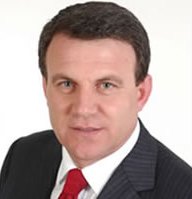Arben Malaj | |
|---|---|
 | |
| Minister of Finance and Economy of Albania 1997 - 2005 | |
| Personal details | |
| Born | 19 September 1961 Vlora, Albania |
| Political party | Socialist Party |
| Spouse | Raimonda Malaj |
| Alma mater | University of Tirana, Harvard Kennedy School of Government |
| Profession | Economist |
| Signature | |
Arben Malaj (born 19 September 1961 in the city of Vlora, Albania) has been Minister of Finance and Economy in the Republic of Albania different times from 1997 until 2005. He is known for transforming the Albanian economy into a European profile, after the hard social-economic crisis that this country passed during the year 1997. He served as a Member of the Albanian Parliament from 1997 to 2013 chairing the Parliamentary Committee on Economy and Finance.
Contents
- Early life and professional career
- Political profile
- Personal life
- Academic life
- Lectures and presentations
- Honors
- See also
- References
- External links
Since 2016 Malaj serves as Member of the Supervisory Council of the Bank of Albania and is Honorary President of the Institute for Public Policy and Good Governance, a think-tank he co-founded in 2013. Prof. Malaj is the author of several economics studies and has mentored many doctoral candidates on topics related to local and global financial developments. He has also published several scientific publications.